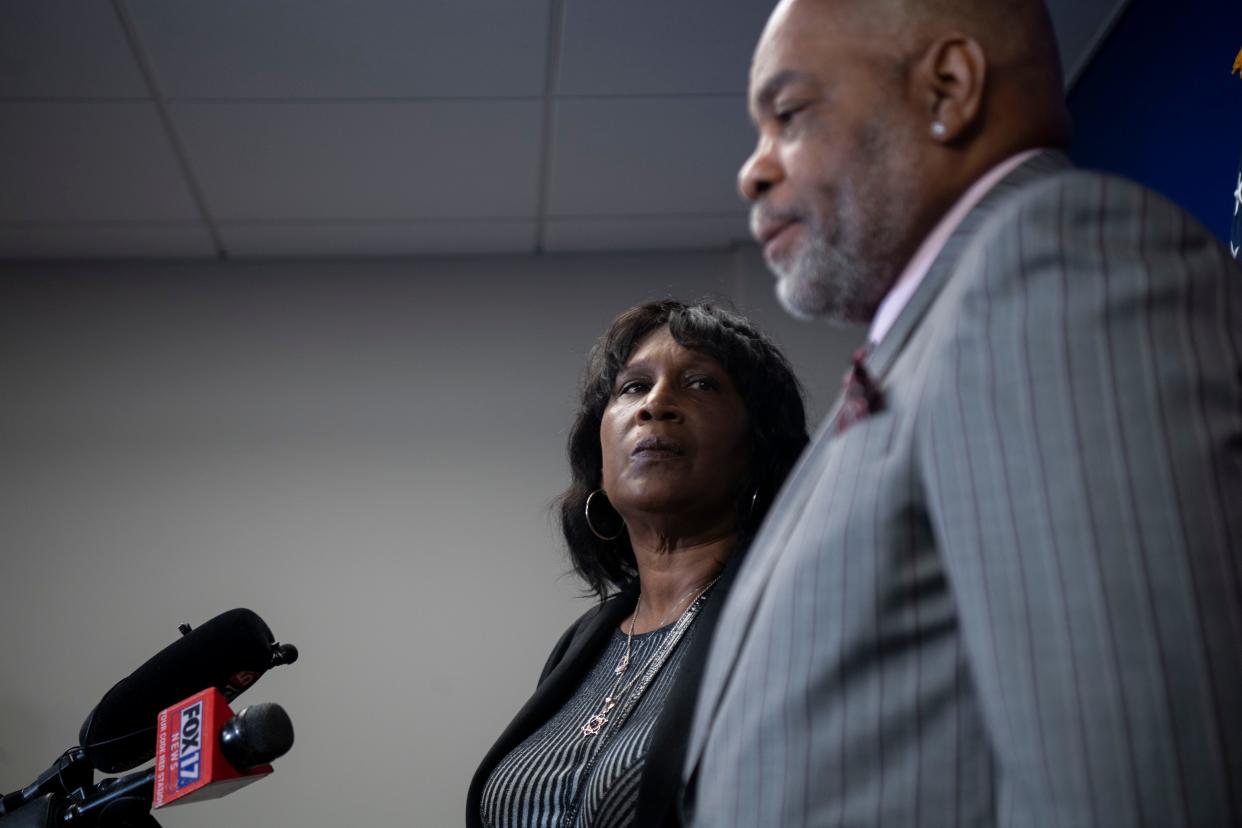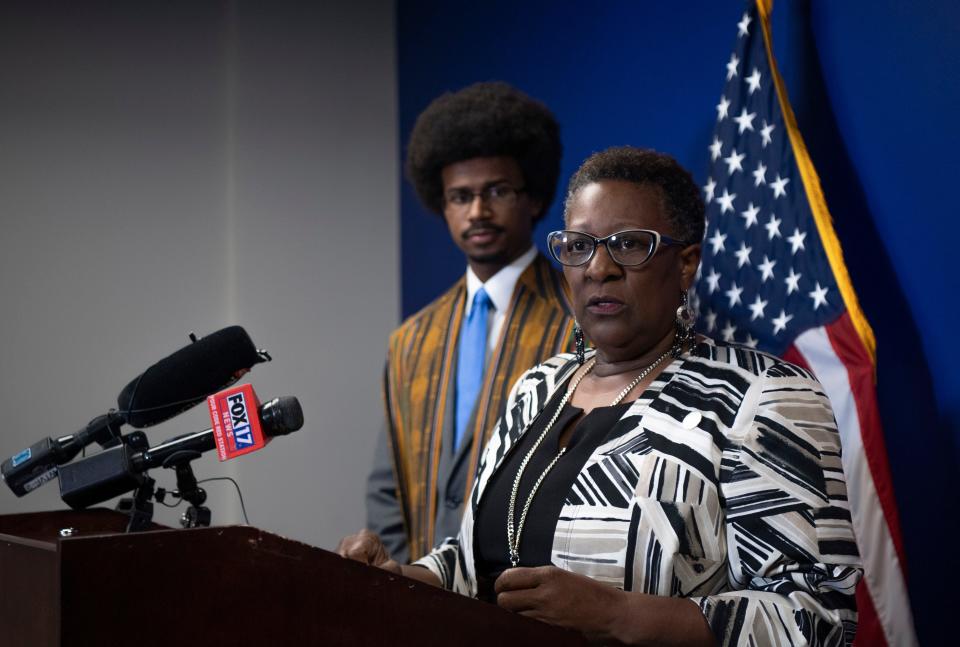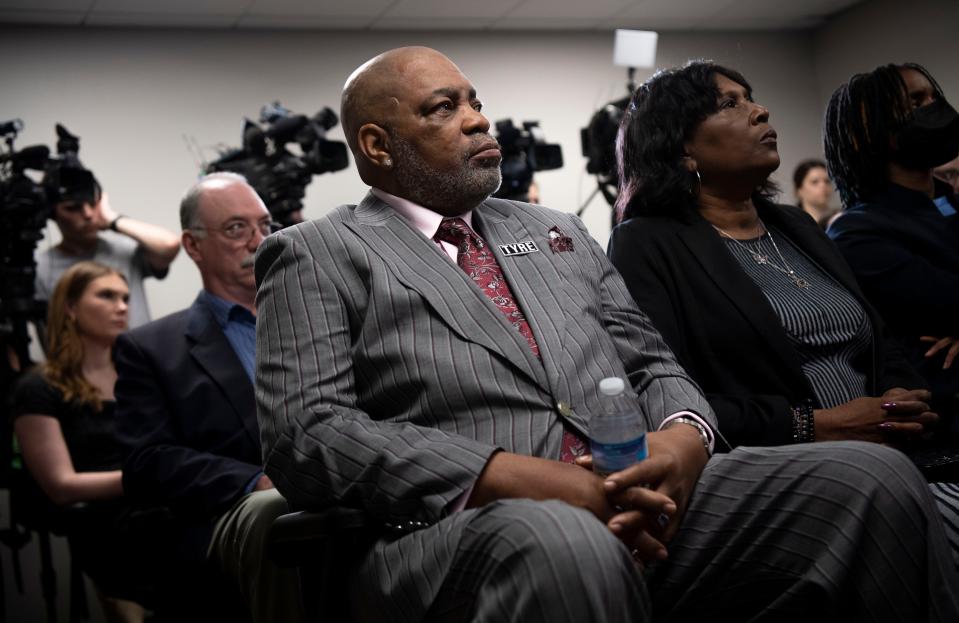TN House punts vote on bill limiting cities from enacting local police reforms. What that means

The Tennessee House Monday punted discussion and a floor vote on a bill that would remove power from local governments to pass police reform legislation.
The bill, filed by Memphis Republican Rep. John Gillespie, has faced backlash from Memphis' local elected officials, activists and the family of Tyre Nichols, a 29-year-old Black man who was beaten by Memphis police officers following a traffic stop in Jan. 2023.
The bill was on the agenda for a floor vote Monday afternoon, but was kicked to the end of the calendar by Gillespie with no discussion. The bill has faced backlash from activists, state Democrats and the family of Tyre Nichols, who have said the bill was filed to overturn an ordinance passed by the Memphis City Council that limits pretextual stops.
Both of Nichols' parents, RowVaughn and Rodney Wells, were in the House gallery to oppose the bill Monday.
The bill was moved to Thursday’s agenda.
As the House session dragged on through Monday night, Gillespie walked upstairs to the gallery and sat beside Nichols' family, speaking for about 10 minutes. Gillespie's bill was later booted to Thursday's House calendar.
Rodney Wells declined to share details of his conversation with Gillespie, characterizing it as a private conversation, but said the couple planned to return to Nashville on Thursday.
"Oh, we'll be back," Wells said.
A spokesperson for Gillespie did not immediately respond to a request for comment asking why a vote on the bill had been pushed back.
A bill with the same language, filed in the Senate by Memphis Republican Sen. Brent Taylor, has passed a committee vote, but not yet been scheduled for a floor vote.
"Tennessee is a law and order state and that means holding criminals accountable for their actions at every level," Gillespie said in a statement ahead of the punting on the vote Monday evening. "Law enforcement must be able to do their jobs without soft-on-crime local ordinances tying their hands. Public safety is top-of-mind for many Memphians and we must empower our police with the necessary resources to keep citizens safe. I sponsored House Bill 1931 to allow authorities across Tennessee to enforce existing state law. We can take back crime-ridden cities through common-sense policies."
Memphis Mayor Paul Young, who took office at the beginning of 2024, wrote to the Tennessee General Assembly at the end of February, requesting the bill not be passed.
"As we continue to develop a dynamic response to crime in Memphis, it's imperative we have the ability to determine policies and practices unique to our context," Young wrote to House and Senate committee chairs. "Limiting the ability of local governments to pass ordinances to this effect would be counterproductive to our efforts. Respectfully, I request that committee members oppose HB1931 and SB25722, and permit local governments and police chiefs to determine appropriate policing policies for their communities."
In a press release that accompanied the two bills' filing, Taylor directly mentioned the Memphis City Council's ordinance banning pretextual traffic stops for a short list of minor offenses. In that release, Taylor said traffic stops are a tool for police that "have resulted in major arrests and the apprehension of violent criminals for years."

Weeks after Taylor and Gillespie filed their respective bills, a group of Memphis activists released a report — Decarcerate Memphis' annual Driving While BIPOC (Black, Indigenous, other people of color) Report — found that although pretextual traffic stops had increased in Memphis in the months after Tyre Nichols was fatally beaten, few of those stops resulted in felony arrests.
The report looked at Tennessee Highway Patrol data, which Taylor had previously touted on social media, and found that out of 11,626 traffic stops conducted in Memphis and Shelby County, 13 resulted in felony arrests.
That report also took a random sample of 1,432 cases from Shelby County's court system from 2023. Of those cases, the report said, 150 began with a pretextual traffic stop. And, of those 150 cases, 91 did not involve any felony charges.

There were 119 cases that had reached a disposition by the time the report was compiled, ten ended with a conviction. Two of those convictions were for felonies. One was for evading arrest and marijuana possession. The second felony conviction was for intent to distribute 2.5 grams of meth.
It is not clear whether the ordinances were enforced by the Memphis Police Department after they were passed. Former Memphis Mayor Jim Strickland wrote to the city council, with days left in his term, and said his office had not enforced the ordinances. MPD Interim Chief Cerelyn "C.J." Davis told reporters after Young had been sworn in that her office had enforced them internally.
The Commercial Appeal requested copies of roll calls, trainings, policy changes and memos that were used within the department to announce that it would enforce the ordinance through the Tennessee Open Records Act in January. That request has not yet been filled.
The ordinance banning low-level pretextual stops banned police from pulling people over for only secondary violations. Those violations were for having registration that expired under 60 days prior; if a temporary tag is in the incorrect place, but clearly visible; if a license plate is not securely fastened to a vehicle, but is clearly visible; if a single brake light, head light or running light is broken; and if the car is missing, or has a loosely fastened bumper.
Police, per the ordinance, can cite motorists for a secondary ordinance during a traffic stop if the traffic stop was initiated due to a primary violation, such as speeding, reckless driving or running a red light.
The ordinance, named in honor of Tyre Nichols, drew support from activists and had wide support from the Memphis City Council.
More: How Tyre Nichols' parents stood strong in their publicized grief, focused on son's life
Rep. Justin Pearson, D-Memphis, and House Minority Leader Karen Camper, D-Memphis, both decried a paternalistic pattern of legislation from the Republican supermajority to chip away at local political control, which Camper said Republicans have hypocritically touted as a priority.
"It is an abuse of our power to go and strip power away from local governments just because we saw them do something that we might not agree with," Pearson said.
Before the House session on Monday, Pearson called for Gillespie to take the bill off notice and said his efforts aren’t supported by many Memphians.
"(Gillespie) represents and is indicative of the Republican Party here that is bent on doing racist, retaliatory things to our majority Black communities, and it needs to stop," Pearson said. "We are not going to consistently stand for being treated this way, because it is disrespectful. It is demeaning, it is racist, it is immoral, it is wrong."
RowVaughn Wells, Nichols’ mother, said Monday she was baffled the state could step in and undo a local ordinance many people had fought for.
"I am just appalled by what Republicans are trying to do in this state," said Rodney Wells, Nichols' stepfather. "Memphis is a majority Black city. For a Republican to come in, regardless of what we’re trying to do and accomplish, to wipe out all of our hard work, I disagree with that wholeheartedly."
Memphis City Council Chairman JB Smiley Jr., who supported the ordinance's passage and questioned Davis as to its enforcement, also sent a letter to state legislators urging them to vote down the two bills.
"The power to enact legislation and dictate policy on a local level should rest with local governments and their police chiefs," Smiley wrote in a letter addressed to House Speaker Cameron Sexton and Lt. Governor Randy McNally. "It is evident that those who live, work, eat, worship and spend their social time in a community they call home know it better than those who do not. The law enforcement challenges facing the various urban, suburban and rural community across the State of Tennessee differ, and therefore, local leaders should be given deference. The same argument that each of you makes regarding federal preemption applies here. As such, I respectfully request that you all apply that same logic in this matter and oppose HB1931/SB2572, as it undermines the ability of those serving in local leadership to make necessary adjustments to local policies that govern policing."
Lucas Finton is a criminal justice reporter with The Commercial Appeal. He can be reached at Lucas.Finton@commercialappeal.com, or (901) 208-3922 and followed on X, formerly known as Twitter, @LucasFinton.
This article originally appeared on Memphis Commercial Appeal: TN House punts vote on bill restricting local power to enact police reform

